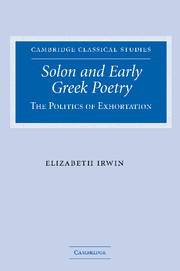Book contents
- Frontmatter
- Contents
- Acknowledgements
- List of abbreviations and editions
- Introduction
- PART I THE POLITICS OF EXHORTATION
- Introduction
- 1 Understanding the political in martial exhortation elegy
- 2 Synthesising content and context
- 3 Contextualising the city: archaic verse inscriptions and the ‘rise’ of the polis
- PART II POLITICAL POETICS: SOLON'S EUNOMIA
- PART III POETRY AND POLITICAL CULTURE
- Conclusion
- Appendix I Who were Tyrtaeus' gymnetes?
- Appendix II λυκάβαντος: when the wolf comes?
- Bibliography
- General index
- Index locorum
1 - Understanding the political in martial exhortation elegy
Published online by Cambridge University Press: 05 November 2009
- Frontmatter
- Contents
- Acknowledgements
- List of abbreviations and editions
- Introduction
- PART I THE POLITICS OF EXHORTATION
- Introduction
- 1 Understanding the political in martial exhortation elegy
- 2 Synthesising content and context
- 3 Contextualising the city: archaic verse inscriptions and the ‘rise’ of the polis
- PART II POLITICAL POETICS: SOLON'S EUNOMIA
- PART III POETRY AND POLITICAL CULTURE
- Conclusion
- Appendix I Who were Tyrtaeus' gymnetes?
- Appendix II λυκάβαντος: when the wolf comes?
- Bibliography
- General index
- Index locorum
Summary
Our notion of ‘exhortation poetry’ is constructed almost entirely from the extant fragments of Tyrtaeus and Callinus. Tyrtaeus seems to epitomise the genre in the lines quoted above. In Tyrtaeus 12 martial valour is couched within a hierarchy of ἀρϵταί: of men with other qualities, Tyrtaeus says οὔτ ἂν μνησαίμην οὔτ ϵ ̓ν λόγῳ ἄνδρα τιθϵίην … (‘I would not remember, nor would I hold him of any account’, 12.1), and claims the primacy of martial valour: ἥδ'ἀρϵτή, τόδ'ἄϵθλον ϵ ̓ν ἀνθρώποισιν ἄριστον|κάλλιστόν τϵ φϵ ́ρϵιν γίνϵται ἀνδρὶ νϵ ́ῳ (‘This is excellence, this is the best prize among men, and finest to win for a young man’, 12.13–14). Such fighting is ξυνὸν δ' ϵ ̓σθλὸν τοῦτο πόληΐ τϵ παντί τϵ δήμῳ (‘this is a common good for city and the entire people/demos’, 12.15), and the personal rewards of such valour are both fame, which transcends the here and now (e.g. 12.31), and the esteem of one's community: λαῷ γὰρ σύμπαντι πόθος κρατϵρόφρονος ἀνδρὸς | θνῄσκοντος, ζώων δ'ἄξιος ἡμιθϵ ́ων (‘For there is a longing among the entire people when the strong-hearted man dies, and while alive he is worthy of demigods’, Callinus 1.18–19).
This type of elegy has a certain ‘inviting’ quality. The simplicity of its language and straightforwardness of sentiment coupled with the scarcity of other texts for the archaic period have made it irresistible to historians and philologists alike.
- Type
- Chapter
- Information
- Solon and Early Greek PoetryThe Politics of Exhortation, pp. 19 - 34Publisher: Cambridge University PressPrint publication year: 2005

